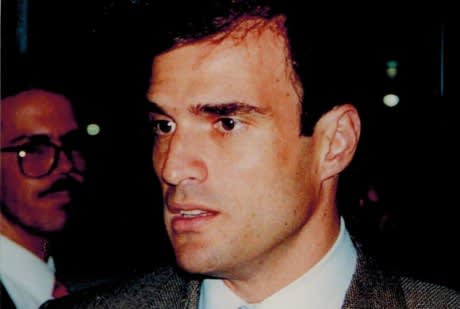Rodrigo Rosenberg, a lawyer in Guatemala with reason to suspect he could be the next victim in a rash of politically motivated murders, records a video in which he prophesizes that if he should end up dead, it's because he has been killed by President Alvaro Colom. When his body is inevitably found shortly after, and the video launches a collective uprising, the many layers that were peeled away on Rosenberg's life in investigating his death are what make Justin Webster's I Will Be Murdered such an extraordinarily spellbinding film.
After stepping in to investigate, the Commission against Impunity in Guatemala (or CICIG) began to sift through all of the evidence. Using interviews with Carlos Castresana—the head of the organization at the time—as a natural guide through the process, the film deliberately protracts the unveiling of evidence. The characterization of Rosenberg is enhanced by hearing from his friends and family, painting a picture of a man so esteemed that even his ex-wife has kind things to say about him.
Castresana can't help but sound as astonished as anyone when discussing the ways they used surveillance footage and wiretaps to expose a network of hit men that led to Rosenberg's murder. Exactly how the death of one of Rosenberg's clients and her daughter motivated his decision to make the fateful video is where the political merges with the personal and the true nature of the crime emerges. Like any good mystery, there are twists and turns made effective by the knowledge that these revelations ultimately changed the consciousness of a nation.
Produced for BBC Storyville, the presentation is slick in its use of stock footage and some dramatizations to alleviate the reliance on talking heads. Obviously, its effectiveness may be influenced by how familiar you already were with the story, but even those already aware of the particulars will likely appreciate the interviews with the prominent figures surrounding the case and an even-handed assessment of Rosenberg's motives and legacy. The fact that a real-life narrative this convoluted never becomes confusing or muddled is a testament to the talents of all those involved.
It's amazing to think how this human drama, with an assist from social media, sparked a population to scrutinize their government during a time where ninety-eight percent of murders went unsolved. When the final act played out on the grandest of stages, a country learned that, as always, truth is stranger than fiction.
(Antartida Produccions)After stepping in to investigate, the Commission against Impunity in Guatemala (or CICIG) began to sift through all of the evidence. Using interviews with Carlos Castresana—the head of the organization at the time—as a natural guide through the process, the film deliberately protracts the unveiling of evidence. The characterization of Rosenberg is enhanced by hearing from his friends and family, painting a picture of a man so esteemed that even his ex-wife has kind things to say about him.
Castresana can't help but sound as astonished as anyone when discussing the ways they used surveillance footage and wiretaps to expose a network of hit men that led to Rosenberg's murder. Exactly how the death of one of Rosenberg's clients and her daughter motivated his decision to make the fateful video is where the political merges with the personal and the true nature of the crime emerges. Like any good mystery, there are twists and turns made effective by the knowledge that these revelations ultimately changed the consciousness of a nation.
Produced for BBC Storyville, the presentation is slick in its use of stock footage and some dramatizations to alleviate the reliance on talking heads. Obviously, its effectiveness may be influenced by how familiar you already were with the story, but even those already aware of the particulars will likely appreciate the interviews with the prominent figures surrounding the case and an even-handed assessment of Rosenberg's motives and legacy. The fact that a real-life narrative this convoluted never becomes confusing or muddled is a testament to the talents of all those involved.
It's amazing to think how this human drama, with an assist from social media, sparked a population to scrutinize their government during a time where ninety-eight percent of murders went unsolved. When the final act played out on the grandest of stages, a country learned that, as always, truth is stranger than fiction.
